9 conclusions from the Cadel Evans Great Ocean Road Races
Weather again unpredictable but exciting races for women and men hit the mark
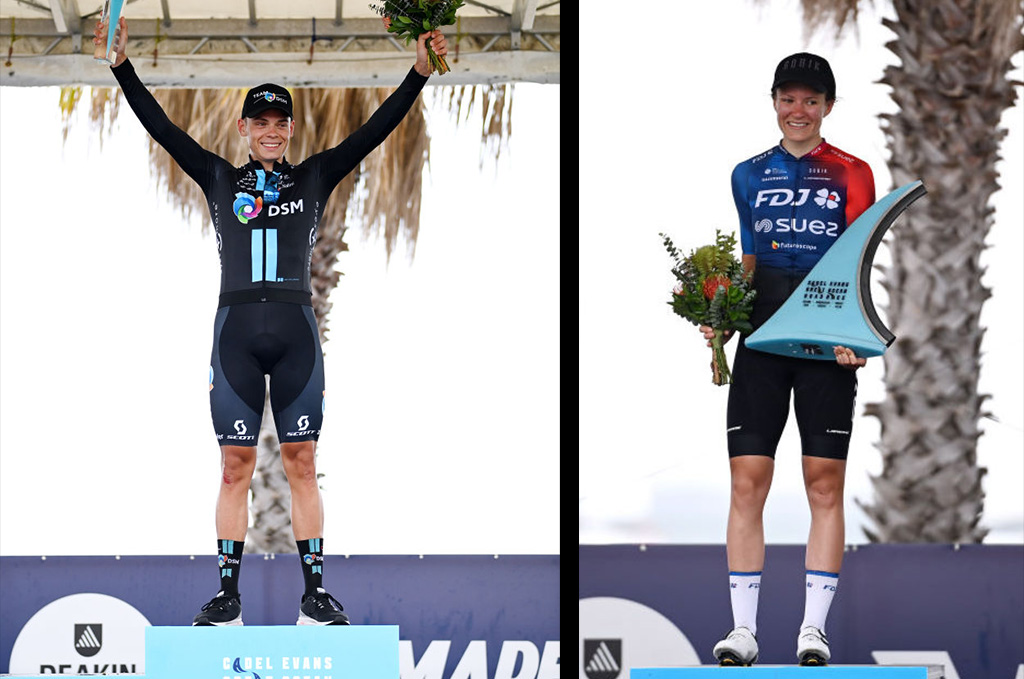
After two years of cancellations the Cadel Evans Great Ocean Road race has been run and won, with two exciting men's and women's WorldTour races in contrasting conditions and winners but the common thread of a dynamic and unpredictable racing across a challenging course.
It was a battle of the climbers on Saturday in the heat and sun, with Amanda Spratt (Trek-Segafredo) and Loes Adegeest (FDJ-Suez) breaking away on the final climb of Challambra and holding off the chase to take the 143km race down to a two-way sprint, won by Dutch rider Adegeest.
Then on Sunday conditions had flipped for the men's race and it was cool and drizzly weather that greeted the riders and crowds. Headwinds on crucial portions of the circuit helped made it hard work for the attackers and ultimately it came down to a reduced bunch on the run into the Geelong finish line. Riders with the reputation and speed of Michael Matthews and Caleb Ewan may have been in that group but after the tough 176km race it was a surprise victor, with the early move of Marius Mayrhofer (Team DSM) winning out.
It was a race of surprises, ever changing fortunes and with a new spin on the traditional course as riders headed out of Geelong to the rolling farmland hills and back via the coast rather than the other way round. It was a fiery finale to an intense January of racing, but now it is time to take a closer look at some of the key takeaways from those final days of international racing in Australia, that also marked the start of the long season to come.
Watch out for those holding an Esport crown
Former Zwift Academy winner and World Esport champion Jay Vine (UAE Team Emirates) made his mark at the Tour Down Under and as the racing transferred to Geelong, it was the turn of another wearer of the Esport rainbow stripes to make their mark, Loes Adegeest.
Adegeest stepped up to Women’s WorldTour squad FDJ-Suez this year and even in her first race with the French team was noticeable in her formidable climbing strength as the Dutch rider helped Grace Brown in pursuit of the Tour Down Under victory. By the time she got to the first climb of Challambra Crescent in Geelong it was clear that she was the one most likely to hold onto an attacking Amanda Spratt so the French squad quickly shifted away from plan A – Brown – and threw in behind the Dutch rider, who didn’t disappoint.
That made it score two for the Esport World Champions this season, and it has only just begun.
A Women's WorldTour reset
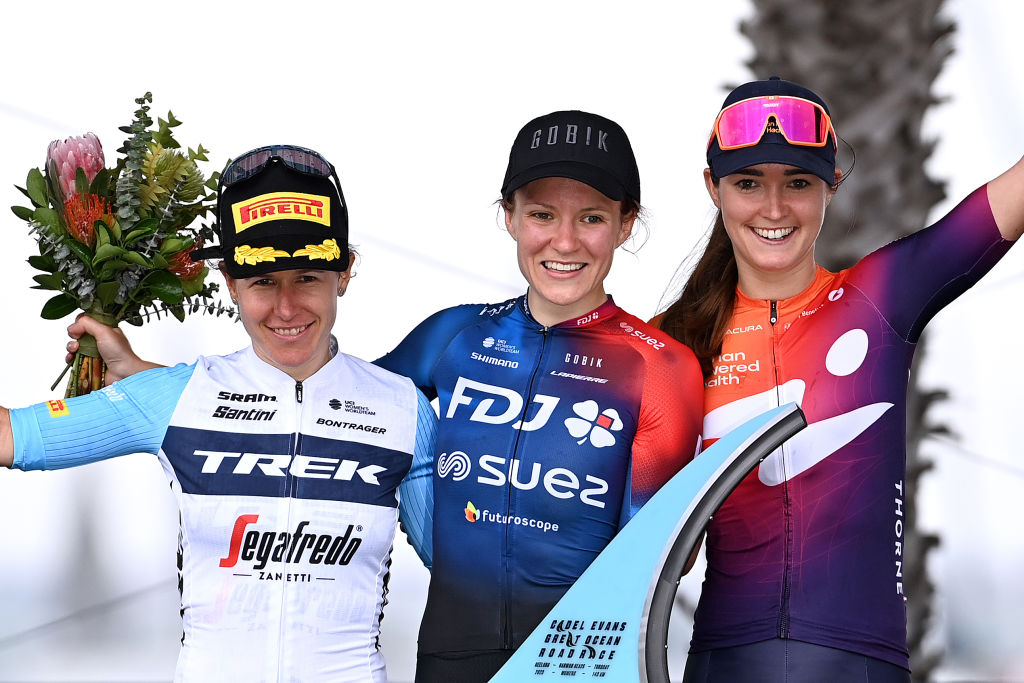
In 2020, the Cadel Evans Great Ocean Road Race didn’t get the Women’s WorldTour debut it deserved. The race which had for so many years been at a high level, had top-tier status bestowed in a year where it seemed everything that could go wrong did – the weather was filthy, the broadcast interrupted as a result and then a mass pile up ensued. After that, there was a global pandemic so the chance to quickly bounce back kept getting delayed. This year, however, it wasn’t just back to normal again, it was better than ever.
Get The Leadout Newsletter
The latest race content, interviews, features, reviews and expert buying guides, direct to your inbox!
The racing was exciting, unpredictable and we got to see it all – right from the early attacks to the final flurry toward the line. The conditions were good, the crowd could enjoy watching by the roadside while slathered in sunscreen, not hiding under umbrellas.
An extra local loop extending the race to 143km and an extra ascent of Challambra added tension and excitement and an additional glimpse of the riders for the fans waiting on the roadside on the Geelong loop. For a race in the style of the Classics, it felt right to have that extra distance. It strung out the action and produced an extra layer of anticipation, although some of those riding may not have been enjoying the addition while straining through that second ascent of Challambra.
Human Powered Health on a high
The US-based team had already taken their first ever WorldTour win in South Australia when Daria Pikulik took victory on stage 1 and they also scooped up a podium place on stage 2 with Nina Buijsman and the best young rider jersey. They had to do no more to walk away from their Australian summer sojourn calling it a success, having already surpassed their WorldTour results tally of the entire 2022 season in just one race. But more was to come.
Another podium for Buijsman and Christie in sixth, which means she will be carrying the jersey of the best young rider of the Women’s WorldTour into the next step of racing. It bodes well for the team’s second year of racing in the top tier, the first year may have been one of finding their feet but judging by their start to the second this is one of chasing victory.
Weather will have its way
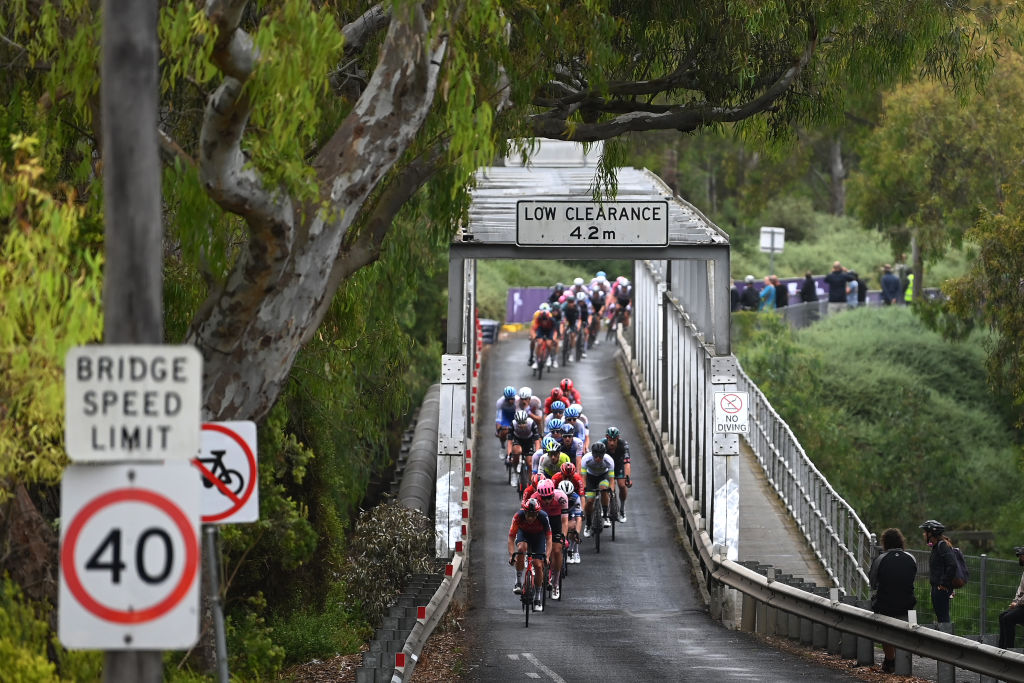
January on the surf coast usually equals stunning vistas out along the sparkling blue ocean, heat, packed beaches and clear blue skies. That’s not what the cameras captured on Sunday as the elite men’s peloton passed through the rolling hills and to Geelong via Bells Beach, Torquay and through Barwon Heads. Instead, it was grey skies and patches of drizzle.
As Taco Van Der Hoorn (Intermarché-Circus-Wanty) crested the climb of Challambra Crescent on the first lap, we didn’t see the clear shot down the steep slope. Instead the unfolding mist limited coverage to the motorbike cameras as the early attacks on the initial loop came from the peloton. Fortunately, the weather turned again for the crucial stages, clearing and we got to watch all the excitement of the final laps unfolding.
Still, it was yet another reminder that while there are so many things that can be controlled around race day – for riders and spectators alike – the weather is not one of them and the heat isn't the only curveball it can throw when it comes to the Australian summer racing.
Predictably unpredictable
This is one of those races where trying to predict the winner has proven either brave or foolish. Both the men's and women's fields defied predictions and delivered first-time WorldTour winners with Loes Adegeest of FDJ Suez and Marius Mayrhofer (Team DSM). Neither had even raced the Cadel Evans Great Ocean Road Race before – yet both played the peloton and the parcours to perfection.
The early season time slot, long trip out to Australia and terrain which includes rolling hills, coastal cross-wind prone roads and the Geelong circuit with the punchy climb of Challambra makes the race predictably unpredictable and therefore, also predictably exciting to watch every single time.
No fairytale ending for Chloe Hosking
The Cadel Evans Great Ocean Road Race holds a special place in Chloe Hosking’s career, having won it in 2018. And, unless things take a positive turn, it could be her very last Women’s WorldTour race given the B&B Hotels team collapse left her without a contract for 2023.
The Australian sprinter had such high hopes going into the race with the Australian team, and put in the work to try and make it either a fairytale ending or, possibly a career reboot. The hard pace of the race, particularly ferocious on the climbs, and the extra local lap and climb of Challambra, meant this was squarely an edition for the climbers. That left more than just Hosking out in the cold and though she fought valiantly in the chase, 29th was the best she could manage in what could be the last race of her storied career. Still, if it was her last WorldTour race, at least she got to say goodbye knowingly and the Australian crowds got that chance as well.
A post shared by Chloe Hosking (@chloe_hosking_)
A photo posted by on
A chance for the Europeans
While the Santos Tour Down Under has a pretty heavy bias toward Australian winners that record seems to flip when it comes to the Cadel Evans Great Ocean Road Race, and even more so for the men's race than the women's. There could be a number of reasons for that, the Classics style parcours or perhaps the time the Europeans have had to acclimatise and build that racing form at the Tour Down Under, gaining back ground on the Australians who have already been at home and racing at their National Championships.
"They always come into Tour Down Under and they are one step behind the Aussies but what they find in their recovery ... and getting over the jet lag when they get that extra week in they are a lot more competitive with the Aussie riders and it happens every year," said Race Director Scott Sunderland.
Though the Australians, who accounted for a quarter of the men's field and more than 40% of the women's, still managed to find a podium spot with Amanda Spratt's second in the women's race and Simon Clarke maintaining his podium record in the race by adding third to his second place the last time he raced in Geelong, back in 2015.
No easy wins for Jayco-AlUla
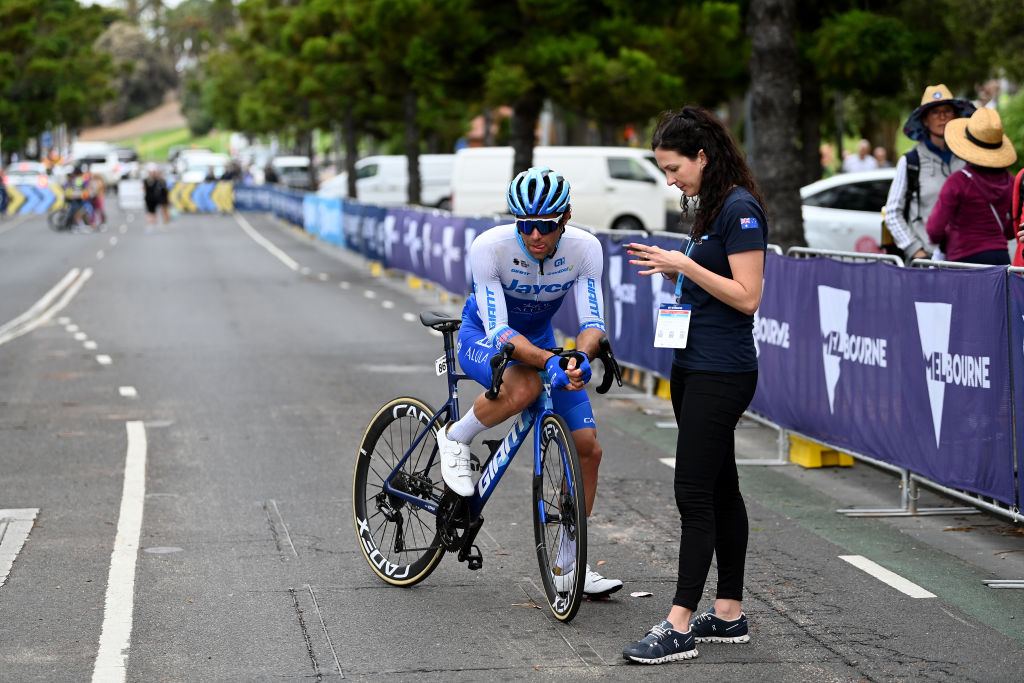
It was yet another race, where a deeply disappointed Michael Matthews rolled past the sideline, leaned over his handlebars, and gathered his thoughts and emotions. Then with the sting of a goal missed still fresh, he still duly faced up to interviews to explain what had happened as he was carrying much of the weight of expectation surrounding the home team. Undoubtedly not an easy task, but probably trivial in degree of difficulty when compared to watching all the hard work and sacrifice put in to prepare for the summer not deliver the results hoped for. In its seven editions Australia’s only WorldTour team has never claimed the men's Cadel Evans Great Ocean Road Race title, and this year they looked like they were in with a good chance – but it just didn’t quite work out. It came down to a selective sprint but Matthews' legs where what he described as “absolutely horrible” but even then he still took fourth.
The women’s team too, had to settle for less than they would have wished with Ruby Roseman-Gannon the top finisher in seventh. Both Australian WorldTour squads had come through the summer in the rare position of not having claimed the Australian road race title or Santos Tour Down Under overall and now the Cadel Evans Great Ocean Road Race has proven out of reach as well. Though, as hard as it may be for the team to not get to celebrate those big victories on home soil, where all eyes are on them, the results also are a testament to the role they have played in the development of Australian cycling, as while they may not have been on the podium former team members were – Simon Clarke and Amanda Spratt were both on the squad in its very first days.
The race isn't back for all, yet
The women’s Santos Tour Down Under may have been Women’s WorldTour ranked this year but without mandatory attendance for the teams within the top tier, less than half of the top level squads lined up, while the men’s teams on the other hand had a full roster thanks to mandatory attendance. That changed for the Cadel Evans Great Ocean Road Race, where the women’s team numbers were largely maintained but as now the men’s teams were also not obliged to attend, seven went home. So what was behind the shift?
Race Director Scott Sunderland believes the race is a victim of circumstances surrounding the pandemic: “It’s exhausting for teams. Not only is it in the work that you have to do and all the testing but also holding those bubbles. We are a bit of a victim of the fatigue of 2022, that has flowed over into 23 and a few teams have said we just need to consolidate and reset.”
Though Sunderland is aspiring to a broader representation next year. “In 2024 we will be back to full strength and we will have all the WorldTour teams back here.”
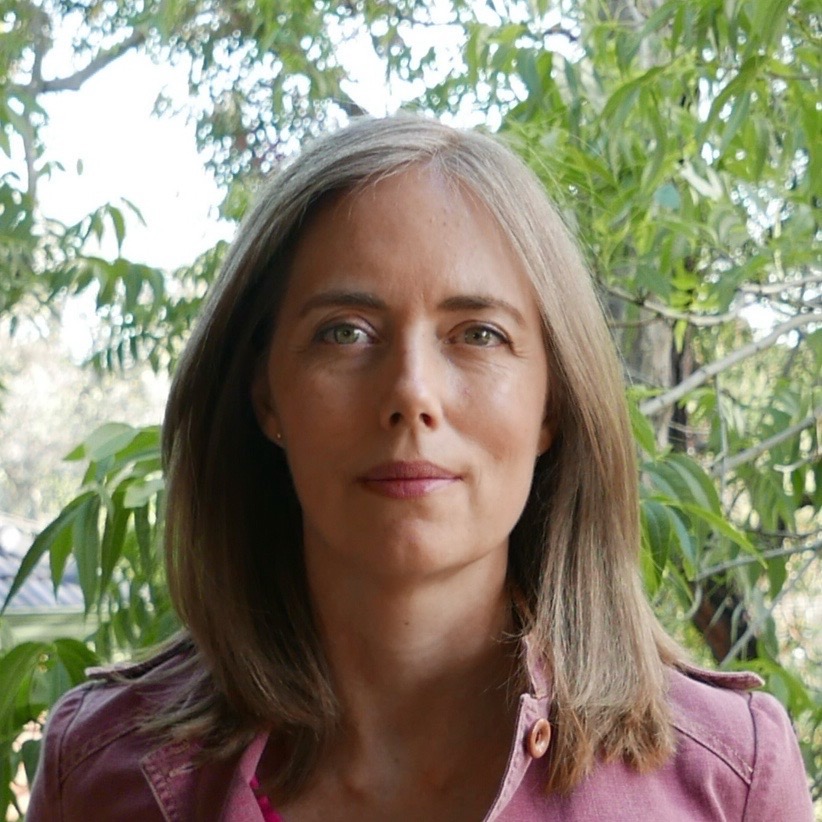
Simone is a degree-qualified journalist that has accumulated decades of wide-ranging experience while working across a variety of leading media organisations. She joined Cyclingnews as a Production Editor at the start of the 2021 season and has now moved into the role of Australia Editor. Previously she worked as a freelance writer, Australian Editor at Ella CyclingTips and as a correspondent for Reuters and Bloomberg. Cycling was initially purely a leisure pursuit for Simone, who started out as a business journalist, but in 2015 her career focus also shifted to the sport.